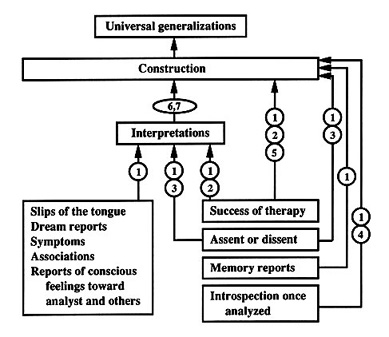Table of Contents |
Psychoanalysis is probably the psychological theory best known by the public. For example, laypersons are familiar with the term "anal retentive." However, psychoanalysis is very controversial among psychologists. Some psychologists claim that psychoanalysis is good science, others that it is bad science, and still others that it is not science. Those who believe psychoanalysis is good science are perhaps the rarest group, and surprisingly not all psychoanalysts fall into this group. Rather, a fair number of psychoanalysts are willing to concede that psychoanlysis is not science, and that it was never meant to be science, but that it is rather more like a worldview that helps people see connections that they otherwise would miss. Psychoanalysis: Is it Science?
Among those who believe that psychoanalysis is not science is the philosopher Karl Popper. Popper holds that the demarcation criterion that separates science from logic, myth, religion, metaphysics, etc. is that all scientific theories can be falsified by empirical tests--that is, a scientific theory rules out some class of events, and if one of those events occurs, then the theory is declared false. According to Popper, psychoanalysis does not meet the falsification criterion because it does not rule out any class of events. Because it explains everything, it explains nothing.
Adolf Grünbaum disagrees with Popper. Grünbaum believes that Freud meant his theory to be scientific, that he made falsifiable predictions, and that those predictions proved false. For example, Freud's Master Proposition, also known as the Necessary Condition Thesis (NCT), is that ONLY psychoanalysis can produce a durable cure of a psychoneurosis (a mental illness caused by childhood trauma). This is a strong statement that could be falsified if, for example, another form of therapy such as behavior therapy cured someone of a neurosis, or even if spontaneous remission occurred. We now know that neurosis yields to both of these alternatives. Therefore, Grünbaum concludes that psychoanalysis, being false, is bad science.
The figure below (Von Eckardt, 1986) represents epistemological problems in Freud's use of clinical data as discussed by Grünbaum (1984) (circled numbers correspond to numbered problems at left; arrows represent the relation "is considered evidence for"). Grünbaum's Arguments

LEVELS
PROBLEMS
Von Eckardt, B. (1986). Grünbaum's challenge to Freud's logic of argumentation: A reconstruction and an addendum. The Behavioral and Brain Sciences, 9, 262-263.
Last modified January 1999
Home to Great Ideas in Personality
References
~ Flip to top ~
Psychoanalysis Links
"Psychoanalysis: Freud's Revolutionary Approach to Human Personality"
Psychoanalysis: Papers Elsewhere
This paper summarizes the theory and considers the arguments of its leading critics, including Eysenck, Grünbaum, and Popper, concluding that the strengths of psychoanalysis outweigh its weaknesses. By Kristen M. Beystehner.
"Psychoanalysis: From Theory to Practice, Past to Present"
This paper discusses not only Freud's theory but also those of more recent psychoanalysts. Common criticisms are discussed and dispersed. By Ethan R. Plaut.
"The Interpretation of Dreams (3rd ed.)"
Psychoanalysis: Websites Elsewhere
Here is the full text of the classic work. By Sigmund Freud.
"The Origin and Development of Psychoanalysis"
This is an authoritative statement on psychoanalysis in the American Journal of Psychology. By Sigmund Freud.
"Question and Answer with Adolf Grünbaum"
This is an imaginary interview with a leading critic of psychoanalysis. By Susan Garea, Kristen M. Beystehner, and Ethan R. Plaut.
"A Review of the Freudian Perspective on Human Motivation"
This paper maintains that Freud's instinct theory, in modified form, still provides valuable insights into human behavior. By John Hamling.
"Sigmund Freud"
This paper is an introduction to Freud's theories. By C. George Boeree.
"A Theory for the 90s: Traumatic Seduction in Historical Context"
This article in Psychoanalytic Review maintains that Freud's move from a theory of specific etiology (the seduction theory) to a more interpretive approach (hermeneutics) represents a step forward. By Douglas A. Davis.
American Psychoanalytic Association
Psychoanalysis: Reference Sources
This organization's website has many useful links.
Anna Freud Centre
This website includes research papers, book reviews, events listings, and details of training, as well as information about Anna Freud and useful links.
Burying Freud
This website links to a number of authors' critical perspectives on the contributions of Freud and psychoanalysis. By Ian Pitchford.
Classics in the History of Psychology
This website links to classic works on psychoanalysis by major theorists. By Christopher D. Green.
Freud Museum London
Based in Freud's last home, this organization's website includes a number of exhibits.
Freud Web
This website contains an overview of Freud's theory of psychoanalysis, its cultural context, and its techniques. By David B. Stevenson.
Google Web Directory: Psychoanalytic and Psychodynamic
This page contains numerous links to websites on psychoanalysis rank-ordered by popularity. By Google.
John Suler's Home Page
This website presents several exercises to help students appreciate the centerpieces of Freud's theory, including (1) defense mechanisms, (2) dreams, and (3) transference. By John Suler.
New York Psychoanalytic Institute
This organization's website contains information and links related to the life and work of Freud, as well as to contemporary psychoanalysis.
Open Directory: Psychoanalytic and Psychodynamic
This page contains numerous links to websites on psychoanalysis ordered alphabetically. By the Open Directory Project.
Otto Rank: Psychologist and Philosopher
This website concerns a psychoanalyst who eventually broke with Freud and pursued his own approach. By E. James Lieberman.
Sigmund Freud Museum Vienna
This website features a chronology, themes, and topography.
Psychoanalysis, Contemporary Views
This entry in the MIT Encyclopedia of Cognitive Sciences is written by a leading expert. By Sebastian Gardner.
Reading Lists on Psychoanalytic Theory and Related Topics
This is an extensive list of psychoanalysis references. By Robert M. Young.
Suggested Readings
A list of suggested readings on this topic is also available. By G. Scott Acton.
~ Flip to top ~
Comments?